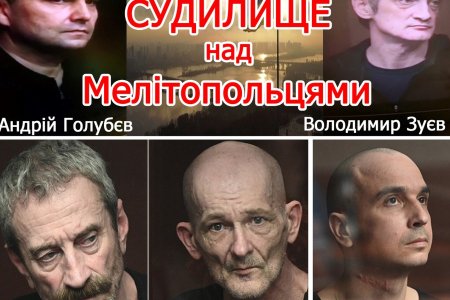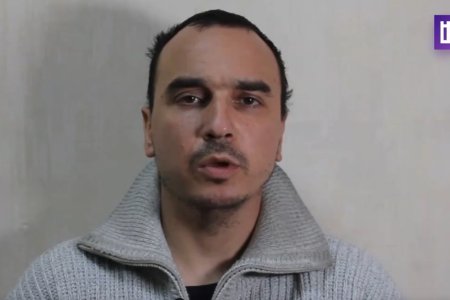
A Russian occupation ‘court’ has sentenced 40-year-old Mykola Budanovsky (or Budovsky) to 18 years’ maximum-security imprisonment on fake ‘sabotage plot’ charges after illegally abducting him from his home. All such ‘trials’ by an occupying power are in violation of international law. They also, however, deny Ukrainians their fundamental right to a fair trial. The ‘indictment’ is based solely on Russian FSB claims that they ‘thwarted a plan’ and an evidently staged video of his ‘arrest’. There is essentially no possibility of monitoring even whether Budanovsky had an independent lawyer, with this seeming unlikely as the FSB video only shows him ‘confessing’ and saying he ‘repents’ to an unrecognized ‘court’.
Budanovsky was accused of having planned to carry out an act of sabotage against the Russian soldiers who invaded and are occupying his native Melitopol. The only ‘evidence’ to back this allegation was provided by the FSB video. This showed a man being violently pulled from a car and forced to the ground. We are presumably supposed to believe that the next shot follows from this, although the person examining the supposedly found stash of explosive devices appears to be wearing slightly different gear. There also seem discrepancies between the images shown in two separate shots of these explosive devices.
No information is provided about the ‘trial’ – how long it lasted, the names of ‘judges’, ‘prosecutor’, etc, nor whether a lawyer (even one appointed for him) was present. Instead of all of this, we hear him saying he ‘confesses’ and ‘repents’.
This, in short, is the same genre used by Russia’s FSB and Investigative Committee since Russia first invaded Crimea in 2014. In occupied Crimea, the FSB has repeatedly claimed that it ‘thwarted’ acts of sabotage, with no proof aside from their assertion and ‘confessions’ extracted from Ukrainians held incommunicado. In a number of cases, independent lawyers have been prevented from seeing their clients. Where, sometimes after the intervention of the European Court of Human Rights, the person has been able to speak with the lawyer of his choice, he has virtually always retracted ‘confessions’ and given harrowing accounts of the electric shocks, beatings, mock executions and other forms of torture used to extract them.
The same is doubtless the case with the prisoners of war whom Russia is ‘sentencing’ to huge terms of imprisonment. There too, Russia’s Investigative Committee or prosecutor announces ‘sentences’ after fake ‘courts’ in occupied Donetsk or Luhansk oblast have passed these. In the vast majority of cases, such reports are accompanied by videoed ‘confessions’ which the men appear to be reading out. We know, for example, from Asan and Aziz Akhtemov that they were forced to learn such ‘confessions’ off by heart and read out more than one before the camera.
The ’sentence’ against Mykola Budanovsky was only announced on 18 September, with the 40-year-old sentenced to 18 years in a maximum security prison colony and a fine of 800 thousand roubles. In fact, the video showing Budanovsky ‘confessing’ while apparently in a court cage (used in Russia and occupied Ukraine for those on ‘trial’) was almost certainly also either staged or older since the sentence has already come into force.
Russia has abducted a huge number of civilians, both men and women, from occupied Melitopol. While the whereabouts of some remains unknown, in many other cases, they have either already been ‘sentenced’ by the same fake ‘Zaporizhzhia regional court’ in occupied Melitopol or face such travesties.
See:
Russia passes huge conveyor belt sentences against Ukrainians tortured for propaganda videos



